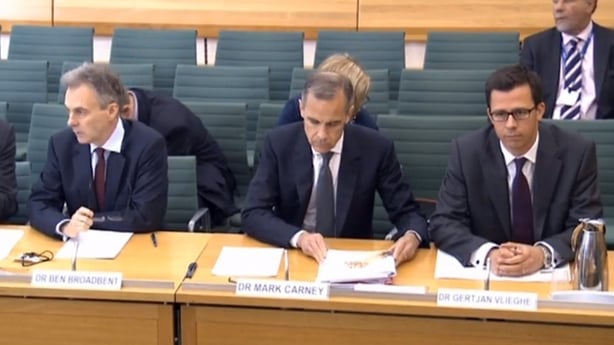Bank of England boss Mark Carney has denied accusations of giving out Treasury Brexit "propaganda" and said it was his job to "come straight with the British people" over the risks.
In a heated Treasury Select Committee grilling, pro-Brexit MP Jacob Rees Mogg accused Mr Carney of being "politically involved".
He said he was colluding with Chancellor George Osborne on warnings over the economic impact of a vote to leave the EU.
But Mr Carney said there was no political bias at the bank and defended its warning earlier this month that a Brexit vote could trigger a UK recession, send the pound plunging and lead to higher borrowing rates.
The hearing comes after a controversial Treasury report yesterday a Brexit could see the UK fall into a technical recession - when gross domestic product falls for more than one consecutive quarter - lasting for a year.
Mr Carney insisted there was "no possibility of undue influence coming from the Treasury".
He said the bank had a responsibility to warn the Chancellor and wider public about the economic risks of a Brexit.
"It's important not just to those in financial markets, but it's important to come straight with the British people about that," he said.
All nine members of the bank's rate-setting committee agreed that a Brexit could have a "material" impact on growth and inflation, he told MPs.
Mr Rees Mogg, who has previously called for Mr Carney to be sacked over his Brexit warnings, said: "It's very convenient that you are putting out the same propaganda as the Chancellor."
Mr Carney confirmed there had been a "series of conversations" with George Osborne and revealed that he was handed an early copy of the Treasury report assessing the impact of Brexit on the UK economy.
He said bank staff had not seen the study before its publication, although he was handed a draft prior to a breakfast meeting with Mr Osborne two weeks ago.
But he gave Mr Rees Mogg short shrift when accused of political involvement and stood by the bank's recent inflation forecast warnings.
 He told MPs: "We have a responsibility to discharge our remit and to the British people, who don't want risks hidden from them.
He told MPs: "We have a responsibility to discharge our remit and to the British people, who don't want risks hidden from them.
"They expect us to come straight and take action to mitigate those risks."
Mr Carney refused to rule out further intervention on the Brexit debate, with the bank set to announce its next interest rate move and minutes of the meeting on 16 June, just a week before the 23 June vote.
Though he said the broad issues have already been set out.
Mr Carney was offered some support from others on the committee, with Rachel Reeves giving Mr Rees Mogg a sideways look and saying: "If anyone's reputation has been damaged I don't think it is the Bank of England."
Mr Carney said the Monetary Policy Committee expects interest rates to rise gradually over the next three years based on a vote to remain in the EU.
He said it was much less clear whether rates would rise or fall in the event of a Brexit vote, although it would "reduce the probability" of a rate rise.
Meanwhile, former Central Bank governor Patrick Honohan has said he understands why Mr Carney made his comments about the potential economic impact of a vote to leave the EU next month.
Prof Honohan was speaking in London, where he also said he believed a British vote to leave the UK would be a strategic blunder.

